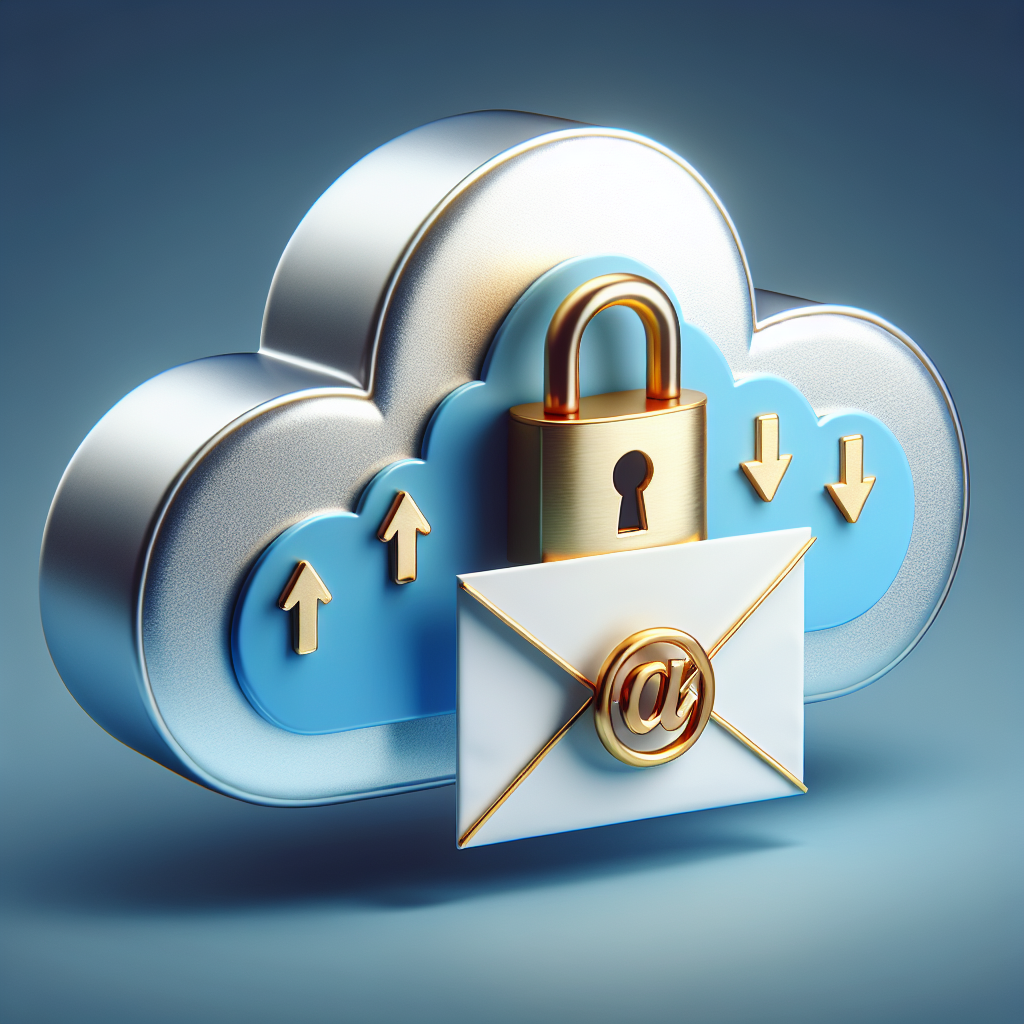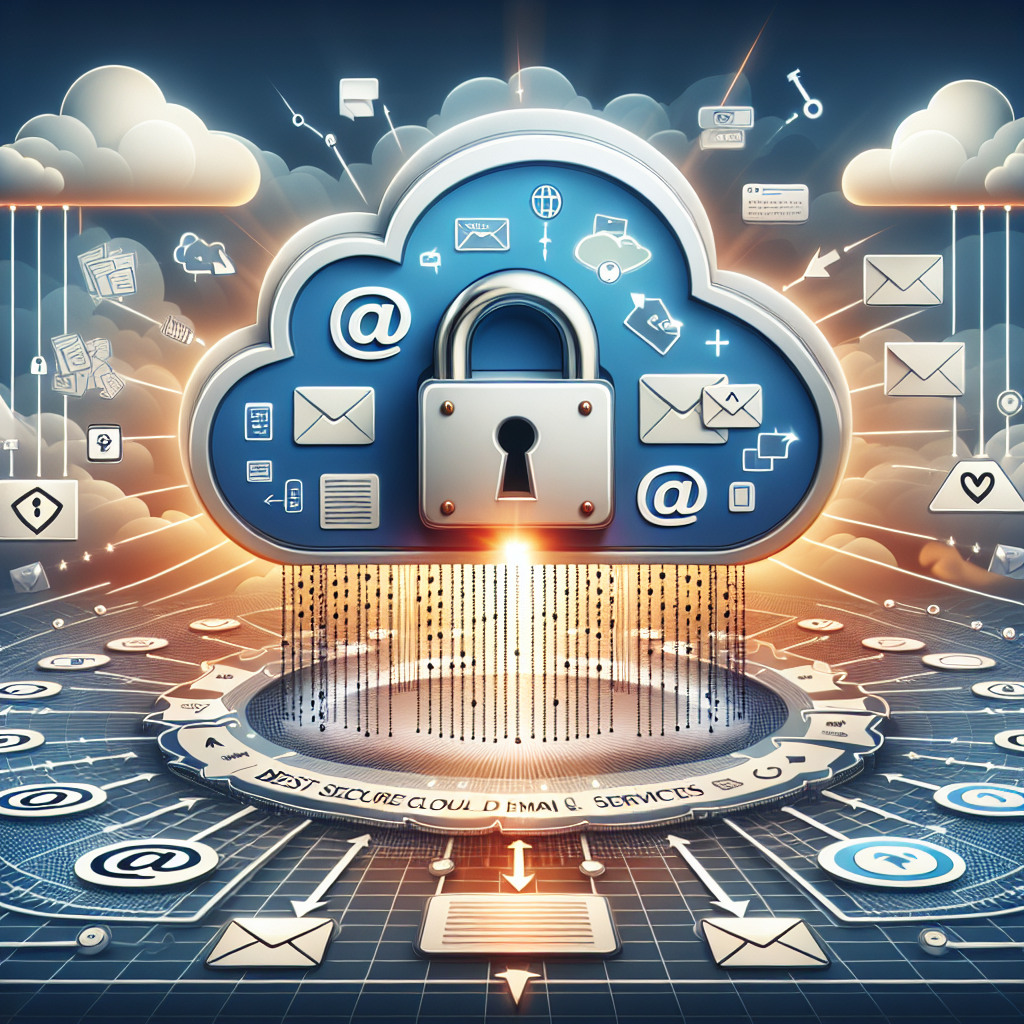In a world where digital communication is fast becoming the norm, the need for secure cloud email services has never been more pressing. From safeguarding sensitive information to protecting against cyber threats, finding the best secure cloud email service is crucial for individuals and businesses alike. This comprehensive guide dives deep into the top secure cloud email services available, offering insights into their features, benefits, and security measures. Explore the cutting-edge technologies that ensure your emails are encrypted, secure, and always protected from potential threats. Stay ahead of the curve and discover the best secure cloud email services for your needs today.
Understanding Secure Cloud Email Services

In the realm of modern communication, secure cloud email services have emerged as a vital component for individuals and businesses alike. These services offer a heightened level of protection for sensitive information exchanged via email, utilizing cloud technology to safeguard data and communications.
Definition of Secure Cloud Email Services
Secure cloud email services refer to email platforms that store data on remote servers maintained by third-party providers. These services offer encryption, access controls, and other security measures to protect emails from unauthorized access or cyber threats. By leveraging the cloud, users can access their emails from any device with an internet connection, enhancing convenience and flexibility.
Importance of Secure Cloud Email Services in Today’s Digital Landscape
With the increasing frequency of cyber attacks and data breaches, the importance of secure cloud email services cannot be overstated. These services help mitigate the risks associated with email communication, ensuring that sensitive information remains confidential and protected. In an era where privacy concerns are paramount, secure cloud email services offer peace of mind to users who rely on email for both personal and professional correspondence.
How Secure Cloud Email Services Differ from Traditional Email Services
Unlike traditional email services that may lack robust security features, secure cloud email services prioritize data protection and privacy. By storing emails in the cloud, these services reduce the likelihood of data loss due to hardware malfunctions or local storage issues. Additionally, secure cloud email services often incorporate advanced encryption protocols and threat detection mechanisms to prevent unauthorized access and mitigate cybersecurity risks.

Key Features to Look for in Secure Cloud Email Services
Secure cloud email services offer advanced encryption, two-factor authentication, and data loss prevention features to safeguard sensitive information exchanged through email. Providers like Google Workspace, Microsoft 365, and ProtonMail prioritize privacy and security, making them top choices for individuals and businesses seeking secure email communication. Regular security updates, employee training on email security, and secure password management are essential practices to enhance the protection of cloud email services against cyber threats.
Encryption Protocols
When considering the best secure cloud email services, one of the crucial aspects to examine is the encryption protocols they utilize. Here’s a detailed look at the importance of end-to-end encryption and the different encryption protocols commonly used in secure cloud email services:
-
End-to-End Encryption:
End-to-end encryption is a fundamental feature that ensures that only the sender and the recipient can access the content of the emails. This means that even the email service provider cannot decipher the messages. It provides an additional layer of security by encrypting the message on the sender’s device and only decrypting it on the recipient’s device, making it highly secure against unauthorized access. -
Different Encryption Protocols:
-
PGP (Pretty Good Privacy): PGP is a widely-used encryption protocol that uses a combination of symmetric and asymmetric encryption to secure email communication. It provides a high level of security by encrypting the message content and attachments.
-
S/MIME (Secure/Multipurpose Internet Mail Extensions): S/MIME is another popular encryption protocol that relies on digital certificates to secure email communication. It verifies the sender’s identity and encrypts the message to ensure confidentiality.
-
TLS (Transport Layer Security): While TLS is not specifically designed for email encryption, it plays a crucial role in securing the transmission of emails between servers. It encrypts the communication channel between email servers, preventing interception and tampering of emails in transit.
By understanding the significance of end-to-end encryption and the various encryption protocols available, users can make informed decisions when selecting a secure cloud email service that prioritizes data privacy and security.
Two-Factor Authentication
Two-factor authentication (2FA) is a security process that requires users to provide two different authentication factors to verify their identity. This typically involves something the user knows (like a password) and something the user has (like a mobile device or security token). By implementing two-factor authentication, secure cloud email services add an extra layer of protection beyond just a password.
Benefits of two-factor authentication in securing email accounts:
-
Enhanced Security: Two-factor authentication significantly reduces the risk of unauthorized access to email accounts, as it requires not only the knowledge of a password but also possession of a secondary verification method.
-
Mitigating Password Vulnerabilities: Since passwords can be compromised through various means such as phishing attacks or data breaches, the additional layer of two-factor authentication helps to mitigate the vulnerabilities associated with relying solely on passwords for account access.
-
Preventing Unauthorized Access: With two-factor authentication in place, even if a malicious actor manages to obtain a user’s password, they would still need the second factor to gain access, making it much harder for unauthorized individuals to breach the account.
-
Compliance Requirements: In certain industries or organizations handling sensitive information, the use of two-factor authentication may be a compliance requirement to ensure data security and privacy standards are met.
Data Loss Prevention
- How Data Loss Prevention Works in Secure Cloud Email Services
Data loss prevention in secure cloud email services involves implementing mechanisms to monitor, detect, and prevent the unauthorized transmission of sensitive data. Advanced algorithms are utilized to scan emails and attachments for specific patterns or keywords that indicate confidential information. Encryption techniques are often employed to secure the data both in transit and at rest within the cloud environment. Additionally, secure cloud email services may offer features such as digital rights management to control access to sensitive information and prevent unauthorized sharing.
- Preventing Unauthorized Access to Sensitive Information
One of the primary objectives of data loss prevention in secure cloud email services is to prevent unauthorized access to sensitive information. Access controls are implemented to restrict who can view, edit, or share certain emails or attachments containing confidential data. Multi-factor authentication, encryption, and secure login protocols help ensure that only authorized users can access the information. Regular security audits and monitoring tools are also utilized to track and detect any suspicious activities that may indicate a potential data breach.
Top Providers of Secure Cloud Email Services
Google Workspace
Google Workspace is a renowned provider of secure cloud email services, offering a range of features and robust security measures to ensure the confidentiality and integrity of email communications.
Features offered by Google Workspace for secure email communication
- End-to-End Encryption: Google Workspace employs advanced encryption protocols to secure emails both in transit and at rest, ensuring that only authorized recipients can access the content.
- Two-Factor Authentication: Users can enhance the security of their accounts by enabling two-factor authentication, adding an extra layer of protection against unauthorized access.
- Advanced Spam Filtering: Google Workspace incorporates powerful spam filtering mechanisms to prevent malicious emails from reaching users’ inboxes, reducing the risk of phishing attacks and malware infiltration.
- Data Loss Prevention: The platform includes robust data loss prevention tools that help users prevent the accidental sharing of sensitive information via email, mitigating the risk of data breaches.
- Secure Collaboration: Google Workspace facilitates secure collaboration through features like encrypted file sharing and real-time editing, enabling teams to work together efficiently while maintaining data security.
Security measures implemented by Google Workspace
- Constant Security Updates: Google Workspace regularly updates its security protocols to address emerging threats and vulnerabilities, ensuring that users are protected against the latest cybersecurity risks.
- Compliance Standards: The platform adheres to industry-standard compliance regulations, such as GDPR and HIPAA, to meet the security and privacy requirements of various organizations and industries.
- Security Audits: Google Workspace conducts regular security audits to assess the effectiveness of its security measures and identify areas for improvement, enhancing overall email security for users.
- Incident Response Team: In the event of a security incident, Google Workspace has a dedicated incident response team that promptly investigates and mitigates any potential breaches, minimizing the impact on users’ data and privacy.
- User Education: Google Workspace offers resources and training to educate users about best practices for email security, empowering them to recognize and respond to potential threats effectively.
Overall, Google Workspace stands out as a top provider of secure cloud email services, offering a comprehensive suite of features and robust security measures to protect users’ sensitive information and ensure secure communication.
Microsoft 365
-
Security features of Microsoft 365 for email communication
- Microsoft 365 offers robust security features to ensure the confidentiality and integrity of email communications.
- Advanced threat protection tools such as anti-phishing measures, malware detection, and encryption protocols help safeguard sensitive information.
- Multi-factor authentication adds an extra layer of security by requiring users to verify their identity through multiple steps before accessing their email accounts.
- Secure Socket Layer (SSL) and Transport Layer Security (TLS) encryption protocols encrypt data transmission to prevent unauthorized access to email contents.
-
Advantages of using Microsoft 365 for secure cloud email services
- Microsoft 365 provides a seamless user experience with a user-friendly interface and integration with other Microsoft applications such as Outlook, Word, and Excel.
- Cloud-based storage ensures that emails are backed up and accessible from anywhere, offering convenience and flexibility for users.
- Regular software updates and security patches are automatically applied by Microsoft, reducing the risk of vulnerabilities and ensuring ongoing protection against emerging threats.
- Compliance with industry regulations such as GDPR and HIPAA makes Microsoft 365 a reliable choice for businesses handling sensitive data that require adherence to strict data protection standards.
ProtonMail
ProtonMail stands out as a leading provider of secure cloud email services, offering users a robust platform with a strong emphasis on privacy and encryption. Founded in 2013 by scientists who met at CERN, ProtonMail prioritizes user security through end-to-end encryption, ensuring that only the intended recipients can access the contents of an email.
Overview of ProtonMail’s secure email services:
- ProtonMail utilizes zero-access encryption, meaning that even the service provider cannot access the encrypted emails stored on their servers. This added layer of security enhances user privacy and confidentiality.
- The platform offers features such as self-destructing emails, two-factor authentication, and the ability to send password-protected emails, further bolstering the security of communications.
- ProtonMail’s user-friendly interface and seamless integration with other email clients make it a popular choice for individuals and businesses seeking secure communication solutions.
End-to-end encryption and privacy features of ProtonMail:
- End-to-end encryption ensures that emails are encrypted on the sender’s device and can only be decrypted by the intended recipient, minimizing the risk of interception or unauthorized access.
- ProtonMail does not require personal information for sign-up, allowing users to create an anonymous account for added privacy.
- The service is based in Switzerland, known for its strong data privacy laws, providing users with an extra layer of legal protection for their data.

- In addition to encryption, ProtonMail incorporates features like email expiration dates and the ability to set password requirements for email access, empowering users to control the security of their communications.
Best Practices for Securing Cloud Email Services
Regular Security Updates
Regular security updates are a fundamental aspect of maintaining the integrity and confidentiality of cloud email services. These updates play a crucial role in addressing vulnerabilities and patching potential entry points for cyber threats.
Importance of keeping email services updated with the latest security patches
- Timely security updates help in fortifying the defenses of cloud email services against evolving cyber threats, including malware, phishing attacks, and unauthorized access attempts.
- By promptly applying security patches, organizations can mitigate the risk of data breaches and safeguard sensitive information transmitted through email communication.
- Regular updates ensure that any identified security loopholes are swiftly resolved, reducing the window of opportunity for malicious actors to exploit weaknesses in the email system.
How regular updates enhance the security of cloud email services
- Updating cloud email services on a regular basis helps in staying ahead of potential security risks and ensures that the system is equipped with the latest security features.
- Continuous monitoring and implementation of security updates enhance the overall resilience of the email infrastructure, making it more adept at detecting and thwarting malicious activities.
- Regular security updates demonstrate a proactive approach to cybersecurity, instilling confidence among users that their communication channels are being diligently protected against external threats.
Employee Training on Email Security
Employee training on email security is a crucial component of safeguarding sensitive information and preventing cyber threats within organizations. By educating employees on phishing attacks and email security best practices, companies can significantly reduce the risk of security breaches through email.
- Educating Employees on Phishing Attacks:
- Phishing attacks are a common method used by cybercriminals to trick individuals into revealing sensitive information such as login credentials or financial data. Employee training should focus on recognizing the signs of phishing emails, including suspicious links, requests for personal information, and urgent messages urging immediate action.
-
Employees should be taught how to verify the authenticity of emails before clicking on any links or providing any information. This includes checking the sender’s email address, looking for grammatical errors or inconsistencies in the email content, and confirming the legitimacy of any attachments.
-
Role of Employee Training in Preventing Security Breaches Through Email:
- Employee training plays a vital role in creating a culture of cybersecurity awareness within an organization. By empowering employees with the knowledge and skills to identify and respond to potential email threats, companies can strengthen their overall security posture.
- Regular training sessions and simulated phishing exercises can help reinforce good email security practices among employees. These exercises can provide real-world examples of phishing attempts and allow employees to practice identifying and reporting suspicious emails.
In conclusion, investing in comprehensive employee training on email security is essential for mitigating the risk of email-related security incidents and ensuring the confidentiality and integrity of sensitive data within organizations.
Secure Password Management
In the realm of secure cloud email services, the foundation of safeguarding personal and sensitive information lies in the realm of secure password management. Ensuring the integrity of email accounts through robust password practices is crucial in thwarting unauthorized access and potential breaches.
-
Importance of strong and unique passwords for email accounts: When it comes to protecting sensitive data stored in cloud email services, the significance of employing strong and unique passwords cannot be overstated. By creating complex passwords that incorporate a mix of letters, numbers, and special characters, users can significantly enhance the security of their email accounts. Moreover, steering clear of easily guessable information such as birthdays or common phrases is imperative in fortifying the defense mechanisms against cyber threats.
-
Using password managers to securely store and manage passwords: In the digital age where individuals juggle multiple online accounts, relying on memory alone for password management is no longer a viable option. Password managers offer a secure solution by enabling users to generate, store, and autofill complex passwords across various platforms. By entrusting the task of password management to reputable password managers, individuals can mitigate the risks associated with password reuse and unauthorized access. Additionally, the encryption mechanisms employed by password managers provide an added layer of protection against potential data breaches.
FAQs for Secure Cloud Email Services
What are secure cloud email services?
Secure cloud email services are email platforms that utilize cloud technology to store and manage email data securely. These services typically offer encryption, spam filtering, and other security features to protect sensitive information from cyber threats.
How do secure cloud email services differ from traditional email services?
Secure cloud email services provide added security measures such as encryption, two-factor authentication, and secure data storage in the cloud. This extra layer of protection helps to safeguard sensitive information and prevent unauthorized access to email communications.
What are some benefits of using secure cloud email services?
Some benefits of using secure cloud email services include enhanced security features, such as encryption and spam filtering, improved data access and storage capabilities, and the ability to access emails from any device with an internet connection. Additionally, cloud email services often offer better reliability and scalability compared to traditional email servers.
How can I choose the best secure cloud email service for my business?
When choosing a secure cloud email service for your business, consider factors such as security features, ease of use, integration capabilities with other tools and software, scalability, and cost. It is also important to evaluate the provider’s reputation, customer support services, and data privacy policies before making a decision.
What steps can I take to enhance the security of my cloud email services?
To enhance the security of your cloud email services, consider implementing strong password policies, enabling two-factor authentication, regularly updating software and security patches, educating employees about phishing scams and email security best practices, and monitoring email traffic for suspicious activity. Additionally, working with a reputable cloud email service provider that prioritizes security can help mitigate risks and protect sensitive information.


